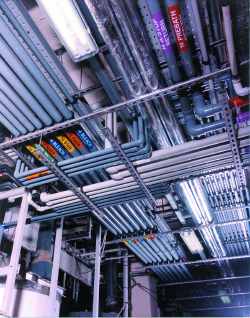Encouraging the wider use of modularisation

The reality of prefabricated pipework is to streamline work on site and carry out much work under quality-controlled factory conditions.
The successful exploitation of modularisation requires the efforts of more than just a few imaginative contractors. Manufacturers have an important role to play, too.Within the construction industry, prefabrication has become an important and cost-effective concept, employed by many fabricators in various disciplines. Within building services, this concept has been extended to modularisation — the ability to match on site requirements by providing multiple pre-assembled units.
Positive move For component manufacturers, this is a positive move away from skills based on-site activity. The challenge to perfect modularisation is seen by many in the industry as paramount. A lack of knowledge and experience are the main reasons for the low uptake of off-site manufacturing in the construction industry, particularly in building services. It is an option still not considered until very late in the construction process. However, some contractors have been adopting modularisation of building services effectively on numerous projects. Crown House Engineering is one such contractor, which recently became a key supplier to BAA and has been chosen to cover BAA’s need for the design, manufacture, supply, installation and commissioning of building services in a fully integrated team environment for projects over £250 000. As part of this process, Crown House advocates and embraces modularisation and uses components from manufacturers such as Durapipe within its factory, then transports the finished module to site for fast and easy installation. According to a statement from Crown House, the company provides high-quality, fast-track delivery of projects by dramatically reducing the need for on-site work — thus greatly reducing on site installation times. With a capital investment programme of about £2 million per day, BAA is one of the UK’s principal developers of infrastructure and views modularisation as effective, cost-efficient and essential in today’s fast-track construction culture.
Streamlined process This is a view with which Chris Ricketts, Durapipe’s key accounts manager, firmly agrees. ‘With building services, there are so many trades involved; indeed, two thirds of the cost in building services is the labour aspect. This makes it also the biggest risk element and is a commodity that can often be manipulated. Modularisation is a lean, streamlined process, which is undertaken under strict quality-controlled factory conditions with testing structures in place for all elements, including ductwork, pipework, electrics, insulation and so on. By constructing building services as a module, the units can be tested as a whole to ensure correct working performance prior to any installation, which ultimately saves both time and money.’ The current skills shortage is one that the industry as a whole and manufacturers in particular are keen to address. Modularisation reduces the need for labour intensity. On an assembly-line in a factory, the element of multi tasking can be employed. However, standardised mass production in building services is rare. ‘Every job is unique,’ warns Chris Ricketts. ‘A system on one floor of a building will possibly not have the same functions and requirements as the floor above and, therefore, modular units need different combinations of components.’ One problem that has arisen from modularisation, not only with plastic pipework but also with metals, is connections. ‘Most single components are designed for installation on site (pipes, flanges, tees, elbows),’ continues Chris Ricketts, ‘so connecting units and ensuring that all enclosed components are also fully sealed and functioning is a distinct challenge. The one criterion to the solution is that the materials enclosed should be lightweight. Traditional steel and copper and other materials that require welding and soldering are simply not suitable for modularised units because of the sheer weight. Plastic is by far the preferred solution, offering ease of handling, especially where large-bore pipework is specified.’
More sympathetic The changing ethos in construction techniques is also proving more sympathetic to the wholesale introduction of modularisation. More and more projects are being awarded on a design-and-build basis, which creates a much tighter team environment. This method has allowed building services to be integrated into the build process much earlier, enabling contractors and sub-contractors to be brought into the frame at the initial design stage — a development that has allowed the concept of a modularised system to be introduced and written into a detailed specification. All services involved in building services (including electricians, plumbers and mechanical specialists) can determine the requirements prior to any construction being carried out and devise a modularised system to be constructed off site. Modularisation offers manufacturers a window of opportunity for new-product development. ‘We are constantly researching and developing new products and systems specifically designed to accommodate the requirements of a modularised building-services unit,’ explains Roy Shepherd of Durapipe technical support department. ‘This is a very proactive approach in several ways. First, it enables contractors to provide successful modularisation. Second, it addresses the current skills and labour shortages. Understanding the contractor’s needs, designing solutions and developing modularisation as a standard construction practice is the future for building services.’ Modularisation is still in its infancy in the building-services industry, but its popularity is forecast to increase as more and more clients and contractors recognise the benefits of pre-assembled units. Investment in product and system development is a key priority for manufacturers to allow this method to be adopted as a viable and cost effective procurement process for construction projects.
Related articles:


